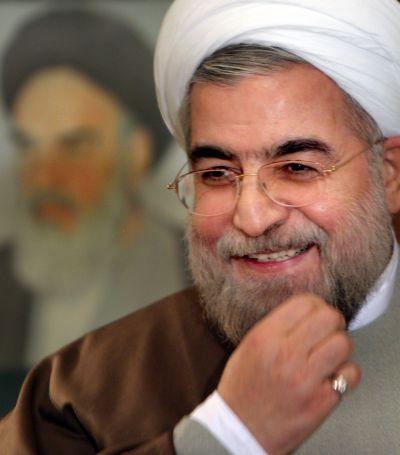 In a rare move that might end the chronic impasse between arch-enemies the United States and Iran, President Barack Obama could meet his Iranian counterpart Hassan Rouhani on the sidelines of the United Nations General Assembly.
In a rare move that might end the chronic impasse between arch-enemies the United States and Iran, President Barack Obama could meet his Iranian counterpart Hassan Rouhani on the sidelines of the United Nations General Assembly.
"I would just say that in general, it's possible. But it has always been possible. The extended hand has been there from the moment the President was sworn into office," White House Press Secretary Jay Carney told reporters here.
However, when asked directly if there would be a meeting in New York next week, Carney said, "there are currently no plans for the President Obama to meet with President Rouhani."
"It's fair to say that the President believes there is an opportunity for diplomacy when it comes to the issues that have presented challenges to the United States and our allies with regards to Iran, and we hope that the Iranian government takes advantage of this opportunity," Carney said.
Rouhani, a moderate cleric, will travel to the US to attend the 68th Session of the UN General Assembly wherein he will address the world leaders on the same day as Obama.
Any meeting between President Obama and Rouhani next week would be historic. The two countries have had no diplomatic relations since the 1979 Islamic revolution that overthrew the Western-backed Shah regime after massive countrywide protests.
US Secretary of State John Kerry also welcomed the recent comments made by Rouhani that Iran will not develop nuclear weapons, but deflected questions about a possible meeting between the two presidents.
"I think Rouhani's comments have been very positive, but everything needs to be put to the test," Kerry told reporters on Thursday.
In an interview to the NBC news channel aired on Thursday, Rouhani said: "under no circumstances would we seek any weapons of mass destruction, including nuclear weapons".
In an op-ed in The Washington Post, Rouhani called for a "constructive interaction" with the United States.
"As I depart for New York for the opening of the UN General Assembly, I urge my counterparts to seize the opportunity presented by Iran's recent election," he wrote.
I urge them to "respond genuinely to my government's efforts to engage in constructive dialogue. Most of all, I urge them to look beyond the pines and be brave enough to tell me what they see -- if not for their national interests, then for the sake of their legacies, and our children and future generations," Rouhani said.
Observing that in this changed world, international politics is no longer a zero-sum game but a multi-dimensional arena where cooperation and competition often occur simultaneously, Rouhani said, gone is the age of blood feuds.
World leaders are expected to lead in turning threats into opportunities, he noted.
Ruing that "unilateralism often continues to overshadow constructive approaches" he said that the unilateral approach, which glorifies brute force and breeds violence, is clearly incapable of solving issues we all face, such as terrorism and extremism.
"I say all because nobody is immune to extremist-fuelled violence, even though it might rage thousands of miles away. Americans woke up to this reality 12 years ago," he said.
"My approach to foreign policy seeks to resolve these issues by addressing their underlying causes. We must work together to end the unhealthy rivalries and interferences that fuel violence and drive us apart. We must also pay attention to the issue of identity as a key driver of tension in, and beyond, the Middle East," Rouhani said.
The Iranian president said the centrality of identity extends to the case of their peaceful nuclear energy program.
"To us, mastering the atomic fuel cycle and generating nuclear power is as much about diversifying our energy resources as it is about who Iranians are as a nation, our demand for dignity and respect and our consequent place in the world. Without comprehending the role of identity, many issues we all face will remain unresolved," he said.
Rouhani said he is committed to confronting the common challenges via a two-pronged approach.
"First, we must join hands to constructively work toward national dialogue, whether in Syria or Bahrain. We must create an atmosphere where peoples of the region can decide their own fates. As part of this, I announce my government's readiness to help facilitate dialogue between the Syrian government and the opposition," he said.
"Second, we must address the broader, overarching injustices and rivalries that fuel violence and tensions. A key aspect of my commitment to constructive interaction entails a sincere effort to engage with neighbours and other nations to identify and secure win-win solutions," he added.
Photograph: Reuters










